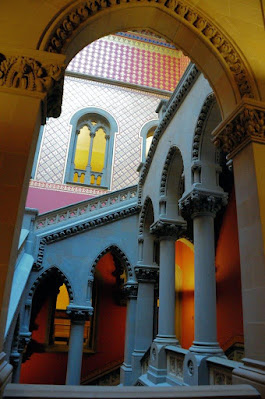State Capitols – Albany, New York - Inside
In April, 2013, I agreed to join a friend in Connecticut for his first senior-level bowling tournament. Since the New York State capitol in Albany was on the way (sort of), it presented an opportunity to finish what I started in 2009. That year, I visited and photographed all the New England state houses on a wonderful autumn drive-about. Lousy planning had me in Albany on Columbus Day and the capitol was closed. Four years later, I finally got inside.
The last post alluded how this generation-long construction project was a boondoggle. The original architect built the first floor in a Romanesque style. After he was fired, the next architect put up the second and third floors in a more Renaissance style. Governor Grover Cleveland canned that firm and the next architect finished the building in a Victorian-Romanesque flourish. As one might imagine, all this firing and hiring created delays and ran up the cost of the project…which further rattled the legislature…which led to more delays.
Again, this personal quest was well-timed since I arrived after much effort and expense was put toward restoring many areas of the building. Decades of dirt, dust and wear were scrubbed away and now the place gleams again.
The Senate has 63 members who are elected to two-year terms. Post-Civil War prosperity is reflected in the opulent Senate chamber. Gold leaf on the walls, Mexican onyx, yellow Sienna marble and red granite from Scotland are part of the décor. I was told that the National Geographic Society considered the New York Senate the finest legislative chamber in the country. These grand rooms evoke the best impressions of democracy in action...as long as you don’t consider how inept and/or corrupt some of the inhabitants can be.
Architect Leopold Eidlitz designed the Assembly chamber and staircase while Henry Richardson designed the Senate chamber and Great Western Staircase. The latter will be presented in a separate post.
The Assembly chamber, the largest room in the capitol, featured the world’s largest open stone arch span. This created two problems. Acoustics in the days before microphones was bad. Worse than that, shifting foundations made the ceiling vaults unstable. When legislators found fallen stone on their desks, changes were mandated.
The vaults were stabilized and a wood drop ceiling was installed. Sadly, the fix also covered two grand murals painted on the high sandstone walls of the chamber. William Morris Hunt was one of America’s premier 19th century painters and he produced the 45-foot-long works that are now hidden by the new ceiling. After he lost much of his collection in the Great Boston fire of 1872, this last insult is said to have contributed to the artist’s suicide in 1879.
On March 29, 1911, major fire destroyed much of the western side of the capitol including the State Library with its unique document collection. The cause was never determined, though some thought it was faulty wiring while others believed it was started by a legislator’s discarded cigar butt. Ironically, attempts to cut construction costs had the builder make the Assembly ceiling with a mix of papier-mâché instead of solid oak. This allowed water to spill through the ceiling and limit the damage. Good thing artist Hunt was not around to see his work further desecrated by fire and water.



















